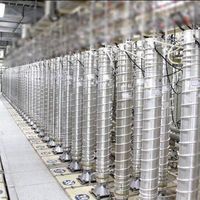Iranian Tea Importer Faces Allegations Of Currency Misuse
The head of Iran’s Inspection Organization has disclosed that a prominent tea importer has come under scrutiny for questionable financial practices.
The company, handling the majority of the country's tea imports, reportedly received a staggering $3.37 billion in foreign currency at discounted government rate for tea and machinery imports from 2019 to 2022. However, it has allegedly sold $1.4 billion of the currency on the free market at a higher rate.
Zabihollah Khodayian highlighted the company's alleged transgressions, emphasizing its violation of premium-grade tea orders. However, he did not disclose the name of the company.
“Despite registering a $14 per kilogram order for premium Darjeeling tea from India, the company purportedly imported significantly cheaper Kenyan tea and bought Iranian grade-two tea at a value of around $2 per kilogram,” added Khodayian.
The government, controlling the economy and foreign currencies allocates cheaper foreign currency to facilitate crucial imports.
The Central Bank of Iran operates the NIMA currency scheme to make imports more affordable and control inflation. The system allows exporters to sell foreign currency at a reduced rate and permits importers to purchase currency at the same lower rate to finance their transactions abroad.
However, the official government rate of around 370,000 rials to the dollar in the NIMA scheme contrasts sharply with the free market rate of about 510,000 rials. This disparity has led to corrupt practices, where well-connected entities exploit the lower rate, obtaining cheap dollars and diverting them for purposes other than intended imports.
The Iranian government, grappling with economic complexities exacerbated by sanctions, regularly intervenes in the currency market to stabilize the beleaguered rial. Despite these efforts, the challenges persist, and instances of currency misuse continue to pose serious concerns.








